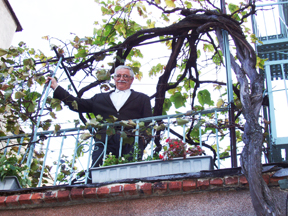The fruit truck was a staple of Seventh Street and Willow Avenue for years. Mike Ferrante and the kid tried a lot of other corners, but this was the corner.
The kid in question, Domenick Amato, isn’t a kid anymore. Amato came to Hoboken from Italy in 1958, a 10-year-old who learned English in a matter of months. That summer, he started working on Ferrante’s fruit truck, and the world of Hoboken became his oyster. Or rather, his strawberry.
“It wasn’t really work,” said Amato, 51, last week. “I could eat a box of grapes and he’d never say nothing.”
He was one of the only high school students able to buy his own car.
________
Healthy competition
Last week, Amato recalled his 10 years working for Mike Ferrante before he received his degree in civil engineering from Rutgers. The days hawking fruit in Hoboken, he still maintains, were some of his best.
Even though at least a dozen trucks flooded the streets at the time, Ferrante’s truck made a profit. Several families peddled produce: Carmine, Sammy, and Mike Iannacone; Joe, Carlo, Joe Jr., and Sandy Sacco; Sonny Martella and the Silettis.
Pick-ups were made just on the other side of the Holland Tunnel in the early days. Ferrante would head over at four or five in the morning to load his flatbed truck. Amato would show up after school when Hoboken’s factories were letting out.
“The kid” had a knack for numbers and could tally the bills of a few customers at once in his head. His first week on the job at 10 years old, Amato made $3 and had all the fruit he could eat. Over the first summer, Amato said he took in $200, between his pay and small tips he was given. He worked all day, 8 a.m. to 7 p.m., except Sundays.
During the school year, he’d sprint from school to meet Ferrante and work until it got dark, almost every day. Even after Amato was accepted to Rutgers University, he still spent a few summers helping out Ferrante with the fruit business.
Splitting the profits
By the time Amato was a junior in high school, he and Ferrante had a special bond. Ferrante trusted Amato and, although he knew Amato would be leaving for college, he offered to split profits with him.
“He sat me down and said, ‘You’re going to need money for college. Here’s what we do…’ He’s proposing it to me,” Amato said. “He’s thinking for my benefit.”
“He’s owned this business since the Depression and he just split everything with a 17-year-old kid,” Amato recalls. “[Ferrante] was extremely trusting. You wouldn’t take advantage of this man.”
It was a very profitable business at the time, too. “You could undersell the supermarket down the street,” he said. “I was making more than my father was, same as I was making five years later as a civil engineer. I paid for college with the fruit money.”
Amato said he was one of the only high school students able to buy his own car, a 1963 Chevy Impala SS convertible. “My father offered to pay for a car, but I said no,” Amato recalled.
People person
Beyond the money, Amato said he learned important life skills working with Ferrante.
“He knew how to deal with people,” Amato said. “Money is not the most important thing.”
People would come to Ferrante, Amato said, hoping to feed the family with some of his tomatoes, apples, and grapes. But some of them were short on funds.
“ ‘Whatever you want,’ ” Amato remembers Ferrante saying. “And he meant it. Every one of them paid him back. You just liked the guy. He taught you something about human nature.”
But in 1964, Ferrante’s back gave out the day before Thanksgiving. Then, his son Bobby joined the crew. Amato came to work that day to find the truck not yet loaded on one of the busiest days of the year. He knew something was wrong.
“Without the old man there, I’m nothing,” Amato said.
Before then, Bobby had worked on the docks and was not particularly interested in following his father’s footsteps as a fruit man. Nonetheless, Amato and Bobby Ferrante sold most of their stock that day, and Amato said Bobby realized how profitable the fruit business could be.
“He saw the money you could make,” he said. “If it wasn’t for that, he may not have gotten into the business.”
Weeks later, Bobby Ferrante bought his own fruit truck that he ran for roughly 30 years.
Last year, the City Council honored Ferrante by dubbing the intersection of Seventh Street and Willow Avenue “Bobby the Peddler’s Corner.”
Some background information was provided by Robert Foster, Hoboken Historical Museum. Foster and Holly Metz published a chapbook in 2008 detailing Amato’s days as a fruit peddler. To read the chapbook or find out more about their series “Vanishing Hoboken,” visit www.hobokenmuseum.org.
Timothy J. Carroll may be reached at tcarroll@hudsonreporter.com.
